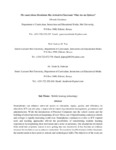| dc.description.abstract | Smartphones can enhance universal access to education, equity, quality and efficiency in education. ICT can also play a major role in improving education management, governance and administration. While the introduction of Personal Computers into the school system and the building of school networks are happening all over Africa, use of digital learning content in schools and colleges is rapidly increasing world over. Smartphones continues to evolve as ICT inspired tools and teaching approaches offered the possibilities of transforming students learning experiences by heightening their motivation and a sense of autonomy. The smartphone revolution from retail into corporate market is now getting into our classrooms. It has become an ordinary resource for teachers to use to enhance instruction. To maximize its effectiveness in the classroom, the teacher needs to have positive attitude and technological skills. The objectives of the study are to; examine the benefits of using tablets in the classroom, options available for using m-learning and challenges faced by both teachers and learners in use of the smart phone This study is informed by the Technology Adoption Model (TAM) which is an information system theory that models how users’ come to accept and use a technology. I shall use the mentioned objectives for argument to probe the research and to provide a path to understanding how tablets in education transform the pedagogy. In an effort to ensure smartphone integration in teaching and learning in schools, the Government has over the years invested heavily in establishment of the requisite ICT infrastructure | en_US |

